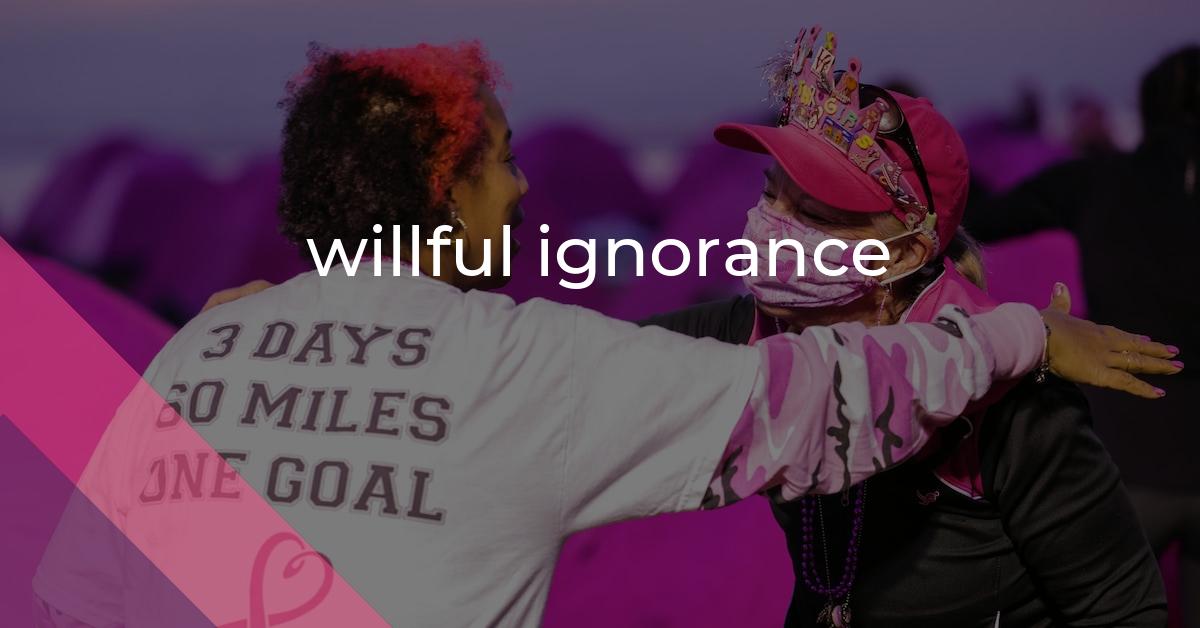willful ignorance: Idiom Meaning and Origin
What does ‘willful ignorance’ mean?
Willful ignorance refers to the deliberate act of choosing to ignore or remain uninformed about something, despite having access to knowledge or information. It implies a conscious decision to disregard facts or evidence that may contradict one's beliefs or preferences.

Idiom Explorer
The idiom "willow in the wind" refers to someone who is easily influenced or swayed by others. It suggests that this person lacks the ability to make independent decisions and is instead easily moved by the opinions or actions of those around them.
The idiom "who wants to know" is used to show indifference or annoyance towards someone who is prying or asking for unnecessary information.
The idiom "which way the wind is blowing" means to be aware of current trends or popular opinions in order to adapt or make decisions accordingly.
The idiom "what was someone thinking" is used to express confusion or disbelief about someone's actions or decisions.
The idiom "what's what" means to understand or know the important or essential information about a subject or situation.
The idiom "what's the difference" is used to express indifference or to question the importance or significance between two choices or options.
The idiom "weasel out" means to avoid or escape from a situation, often through deceitful or cunning behavior.
The idiom "wave away" means to dismiss or disregard something casually or without giving it much attention. It conveys the action of waving one's hand in a gesture that signifies indifference or lack of importance.
The idiom "watch one's mouth" means to be careful about what one says, especially to avoid saying something offensive or disrespectful. It emphasizes the importance of choosing words wisely and being mindful of the impact they may have on others.
The Power of Ignorance
Willful ignorance is an idiom that describes a deliberate decision to remain uninformed or uneducated about a certain topic or issue. It implies a conscious choice to disregard or reject available information or evidence. The phrase can also connote a refusal to acknowledge or confront uncomfortable truths or realities.
The idiom "willful ignorance" is comprised of two words with distinct meanings. "Willful" refers to a deliberate or intentional action, emphasizing that the ignorance in question is not accidental or unintentional. "Ignorance," on the other hand, denotes a lack of knowledge or understanding about a particular subject. Together, these words create an idiom depicting a conscious decision to remain uninformed despite the availability of information.
Willful ignorance is often associated with various negative connotations. It is seen as a form of intellectual dishonesty or stubbornness, as individuals intentionally choose to ignore facts or evidence that contradict their beliefs or opinions. The idiom is frequently used in discussions about political or social issues.
While willful ignorance is a common human behavior, its consequences can be significant. By actively avoiding information that challenges their worldview, individuals may hinder personal growth, perpetuate misconceptions, or contribute to the spread of misinformation. This idiom highlights the potential dangers of disregarding objective facts and critical thinking in favor of subjective biases or wishful thinking.
It is worth noting that willful ignorance is not limited to any specific context or domain. This idiom can apply to a range of situations, including personal relationships, academic pursuits, scientific endeavors, and societal debates. It underscores the universal human tendency to protect existing beliefs and opinions, even at the expense of intellectual curiosity and the pursuit of truth.
While willful ignorance is often viewed negatively, some argue that it can serve as a self-preservation strategy or a way to maintain mental well-being. In a world inundated with information, consciously choosing to ignore certain details may be necessary for emotional stability or sanity. However, this perspective remains controversial, and many argue that intellectual honesty and a willingness to engage with differing viewpoints are essential for personal and societal growth.
As with many idioms, the exact origin of "willful ignorance" is unclear. It is challenging to trace the precise moment when these words began to be used together to convey this specific meaning. However, the concept of willful ignorance has likely existed for as long as humans have grappled with complex concepts and the discomfort of challenging their existing beliefs.
One related idiom that is often used interchangeably with "willful ignorance" is "put one's head in the sand." This idiom derives from the behavior of ostriches, which are believed to bury their heads in the sand when they are frightened or threatened. The idiom implies a deliberate avoidance or denial of unpleasant or uncomfortable information, similar to the concept of willful ignorance.
Another related idiom is "stick one's head in the sand," which is similar in meaning to "put one's head in the sand." Both idioms convey the idea of deliberately avoiding or ignoring information that might challenge one's beliefs or opinions.
Understanding the concept of willful ignorance and related idioms like "put one's head in the sand" and "stick one's head in the sand" can help us recognize and address this behavior in ourselves and others. By actively seeking out diverse perspectives and challenging our own beliefs, we can overcome the trap of willful ignorance and strive for intellectual growth and self-improvement.
Willful ignorance is an idiom that refers to a conscious decision to remain uninformed or uneducated about a particular subject. It signifies a deliberate choice to reject available information, often driven by personal biases or a desire to maintain existing beliefs. While this behavior may offer temporary comfort, it can have significant consequences in personal, academic, and social spheres. By understanding and addressing our own tendencies towards willful ignorance, we can strive for intellectual honesty, personal growth, and a more informed society.
Example usage
Examples of how the idiom willful ignorance can be used:
- He purposely avoided reading the news to maintain his willful ignorance about current events.
- Despite being presented with evidence, she chose to ignore it out of willful ignorance towards the truth.
- The company's CEO displayed a disappointing level of willful ignorance regarding the unethical practices happening within the organization.
More "Behavior" idioms



